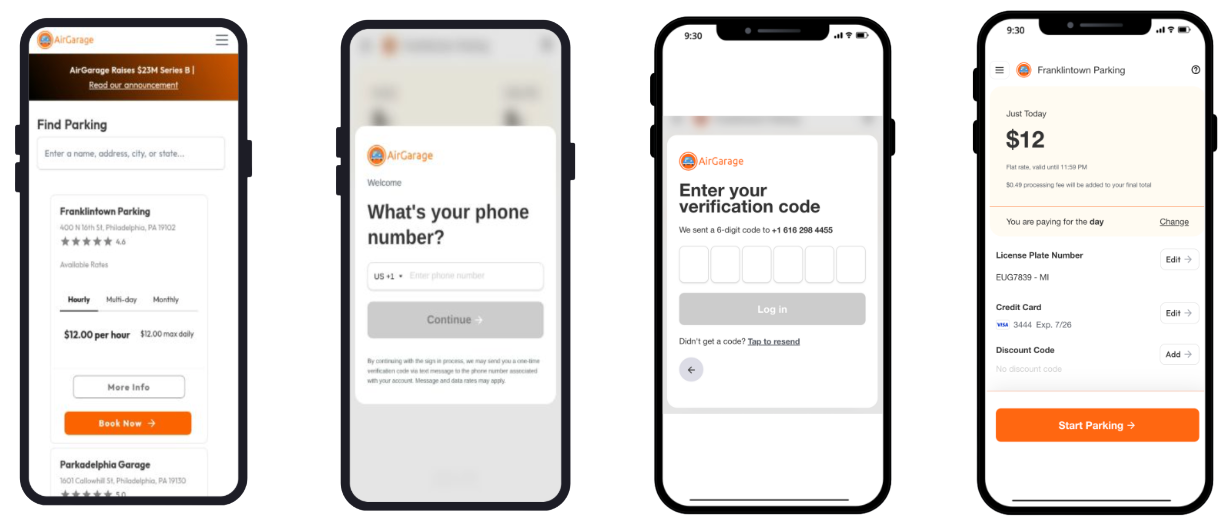AirGarage Raises $23M Series B |
Improving the parking reservation experience can directly impact revenue. Yet, despite how important this step is, the digital booking process is often overlooked.
When someone decides to reserve parking, they’re usually in a hurry. They might be booking a spot for a concert this weekend, a flight tomorrow, or even a meeting later today. In those moments, the booking process needs to be quick and simple. If it isn’t, customers will abandon the process and look elsewhere.
To better understand how parking apps perform, we tested eight of the most widely used reservation platforms. We focused on three areas that matter most to customers:
Once the data was in, we compared the results to our own performance and to benchmarks from industries like travel, hospitality, and retail, where booking and checkout flows are studied extensively. The results of our research offer parking and real estate owners a clear picture of how their industry stacks up, and the growth potential possible with even small improvements.
We evaluated the mobile and web booking process for eight major parking reservation platforms. To keep the analysis consistent, we focused on the reservation flow itself, from the moment a customer selects a location to the point where the booking is confirmed and the purchase is completed. We measured performance in two main categories:
We first looked at how quickly the apps load and respond. This includes how fast the main booking form shows up, how quickly the page looks ready, whether the page freezes before you can click, and how long it takes to finish a reservation from start to finish.
In more technical terms, we measured the mobile and desktop performance of things like LCP, TBT, and Speed Index using baseline data from Page Speed Insights. Together, these measures show how fast the page actually feels to a customer.
To gauge simplicity and ease of use, we assessed whether customers are likely to complete the parking reservation process with little to no frustration or unnecessary delays based on the aspects below:
The results showed a pretty wide range of performance across the industry, and our testing revealed three clear takeaways:
Load speed is the worst performing category.
The fastest parking reservation platforms we tested loaded in under 2 seconds, but most took 4–6 seconds. Most reservation apps exceed the recommended baselines by 2x or more, even though every extra second of delay can reduce conversions by up to 20%.
Simple checkout flows are rare.
For parking platforms, the industry average exceeds best practices by 150%, with several cumbersome checkout flows requiring 6–8 steps or more before confirming a spot reservation. In travel, 41% of mobile bookings happen within 48 hours of the trip. Parking is even more last-minute, with many reservations made for same-day or next-day uses.
Mobile-first design is lacking.
Platforms that were designed for desktop first delivered clunkier mobile experiences. For mobile users, research shows that more than half will leave a site if it takes longer than 3 seconds to load. Since most parking reservations happen on smartphones, this is a major gap.
Account creation is surprisingly time consuming.
Some platforms required multiple pages of information, email verification, and long forms before a booking could be completed. This is a major gap, since each additional step in the booking process can reduce conversions by 10–20%.
Here, AirGarage’s process stands out in comparison to the average industry approach. We built our booking process with a mobile-first mindset, allowing drivers to enter only their phone number to complete a reservation even if they haven’t downloaded the app.
The customer’s mobile device is used to validate a new or existing account instantly, without leaving the checkout flow. Later on, the driver can progressively add more information to their account profile, download the app, and more - though none of this is required to actually book parking in advance or start their parking session.

Though we didn’t include it in our formal analysis, other aspects of an effective design and process for web and mobile booking apps include:
We cover pricing and fee information across the parking industry in our full piece on when, why, and how hidden parking fees are used.
Research shows that even a one‑second improvement in load time can lift conversions by double digits, and streamlining the checkout flow from five or more steps down to three or four can significantly increase completed bookings.
For parking owners, the math is simple: raising a mobile conversion rate from 2% to 3% results in more reservations without spending anything extra on marketing. Faster, simpler booking leads to higher occupancy and stronger customer loyalty.
As a vertically-integrated parking management provider and technology platform, AirGarage helps our partners optimize their mobile and web booking experience and grow their presence across more discovery and reservation channels. We continually test, refine, and improve our flows for a superior customer experience that drives bookings and customer loyalty.














